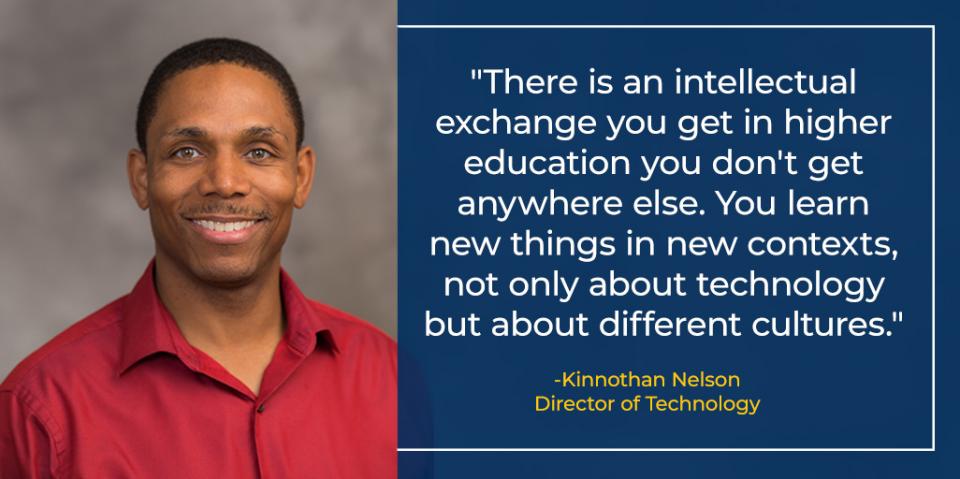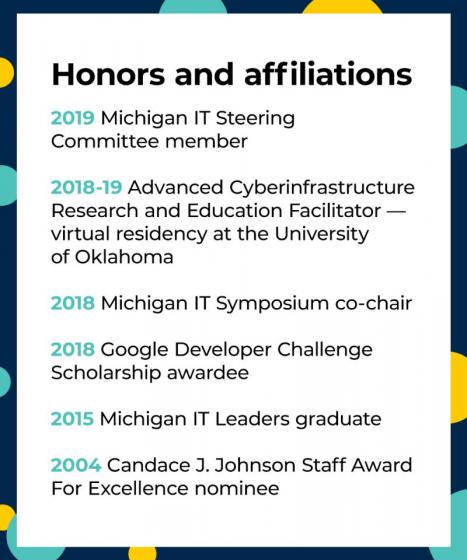Leading the Way: Kinnothan Nelson, Director of Technology

Kinnothan Nelson’s journey to Ann Arbor began in Ninety Six. No, not 1996, but the small South Carolina town of less than 2,000 people where he was born. He spent much of his childhood going back and forth between Flint and Ninety Six before enrolling at the University of Michigan, where he turned extracurricular interests into a successful career spanning more than two decades.
In South Carolina, Nelson’s grandparents reinforced the value of education and supported his interest in technology at an early age. They were the first in their respective families to go to college before becoming educators themselves.
“Most of the people from the town had not gone to college,” he explained. “They kind of started it. My parents met at Michigan State, and my dad was the first in his family to go to college, so they all reinforced that education was critical. For them, being a well-educated person meant having self-determination.”
When Nelson was in elementary school, his grandparents bought him a TRS-80, one of the earliest mass produced home computers.
“I don’t know how, but I talked them into buying it for me,” he remembered. “This is when those first-level computers were coming out, so I did some initial programming and wrote a couple games on the TRS-80. I did a lot of work with computers when I was younger, but I never thought I would be working in that arena.”
“It was just me helping people out.”
Nelson graduated from U-M with a general studies degree in 1997, concentrating in psychology, political science and history. He was a good student, but it was his experiences outside the classroom that laid the foundation for his career.
When Nelson arrived in Ann Arbor his freshman year, the university was just starting to install Ethernet infrastructure across campus, including physical networks in the dorms.
“I went through my hallway and started helping people get set up, then I got everyone in my dorm connected,” he said. “Eventually people started offering to pay me for it. It wasn’t anything I intended — it was just me helping people out.”
Requests for his services increased, and Nelson eventually learned about new work-study positions being offered through U-M’s Information and Technology Services (ITS) department.
“Someone told me, ‘You know, you can actually work for real doing this.’ And I thought, well, I’ve got some loans. That would be helpful.”
In the university’s computing labs, Nelson familiarized himself with the latest technology in his spare time.
“Pretty much any resource you wanted you could find it here,” he said. “The computing labs had Macs, Linux and Unix boxes, and no one was using them. So working on those machines helped expand my knowledge. By the time I got to ITS, I had a pretty solid foundation.”
Through his work-study position, Nelson received formal training that allowed him to hone his theoretical knowledge. Eventually, the department offered him a job as a contractor.
“People ask why I didn’t apply for a computer science degree, but I wasn't even thinking about that as a career path at the time,” he recalled. “It was just something I did. When I took the job with ITS, I had been preparing to take the LSAT and go to Law School."
 Sticking around at the School of Nursing
Sticking around at the School of Nursing
As contractor, Nelson made connections throughout the university, including at the School of Nursing. When a full-time position opened up on the school’s Computing and Technology team, he jumped at the opportunity. He started on the IT help desk in, taking on new roles and responsibilities over the years before being promoted to the school’s director of technology in 2015.
“I knew nothing about nursing when I first got here in terms of what our faculty did and what the students were learning,” he said. “I’ve gained a great appreciation for their work and always look for new learning opportunities, especially when it comes to exploring research and evidence-based practice.”
Nelson’s thirst for knowledge has helped propel him throughout his career, and it’s part of what has kept him at U-M for more than 20 years.
“I’ve always liked the fact that I work in a place of higher learning,” he said. “When you're trying to learn about different technologies, gain exposure to new technologies and understand different ways to learn, this is a great place to be.”
It’s also about people. At the School of Nursing and across campus, the connections Nelson builds bring a rich diversity of thought and experiences that continue to help him grow.
“There is an intellectual exchange you get in higher education that you don't get anywhere else,” he said. “You've got people here who can who think about technology in ways you would never consider, so you learn new things in new contexts, not only about technology but about different cultures. All of it comes into play.”
Throughout his life, Nelson has let a desire to keep learning lead him in new directions. From Ninety Six to Ann Arbor, from the dormitory tech expert to director of technology, that persistent pursuit of knowledge has served him, and the U-M School of Nursing, well.
Scholarly contributions
Throughout his career, Nelson has been a vital contributor to a number of research projects at the School of Nursing and beyond. As an advisor and author, Nelson's expertise has been essential to the development of various interventions and technological advancements.
- Arslanian-Engoren C, Giordani B, Moser Debra K, Nelson K, “Evaluation of a computer-based, nurse-led cognitive training and educational pilot intervention to improve self-care management decisions in adults with heart failure” Presented at the 43rd Annual Midwest Nursing Research Conference, March 2019, Kansas City, MO.
- Nelson K, Horton T, Monville J, “From coincidental to strategic collaborations and partnerships” presented at the 2017 Michigan IT Symposium.
- "Attitudes and opinions of African-American breast and cervical cancer survivors towards a proposed online resource and electronic support group for the Black Belt Area of Alabama" supported the implementation of text messaging and mobile device deployment to participants and helped draft the initial grant proposal and IRB approval through the University of Alabama-Birmingham in 2015.
- Nelson K, Chang T, Rasmussen J, “School of Nursing Active Learning Classroom Technology Pilot” presented at the U-M School of Nursing in 2014.





